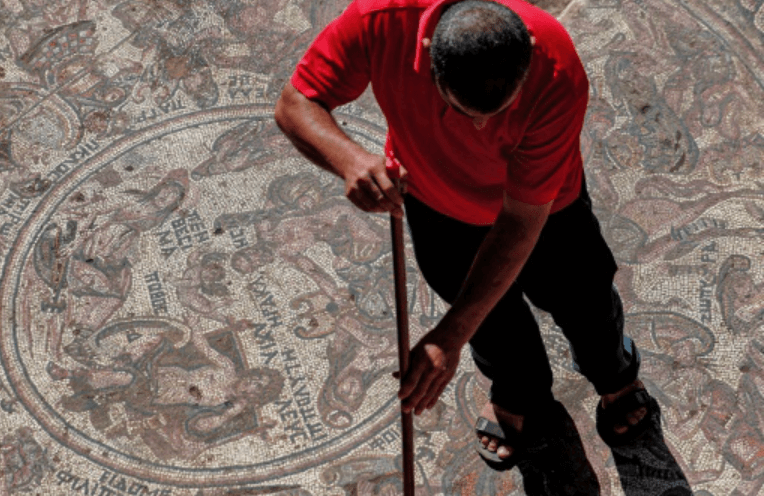Syria unearths stunning Roman-era mosaic

A man sweeps dirt off a mosaic floor discovered in Rastan in northern Syria’s Homs district
Ar Rastan – Syria on Wednesday revealed a remarkably intact 1,600-year-old Roman-era mosaic including depictions of warriors in the Trojan War, with authorities hailing it as one of the “rarest” found.
The mosaic is the latest to be found in Rastan in northern Syria’s Homs district, which the government seized back from rebels in 2018 after years of bloodshed.
Soldiers carrying swords and shields are seen with the names of Greek leaders who took part in the Trojan War, said Hammam Saad, who heads excavations and archaeological studies at Syria’s General Directorate of Museums.
“It is not the oldest of its kind, but it’s the most complete and the rarest,” Saad said. “We have no similar mosaic.”
Discovered beneath a building, archaeologists have so far revealed a mosaic stretching some 20 metres (65 feet) long and six metres wide, but it is believed that more remains to be found.
Syria was an archaeologist’s paradise, home to some of the oldest and best-preserved jewels of ancient civilisations, but over a decade of war damaged beyond repair some of its fabled past.
Mosaics adorn many of Syria’s most famous archaeological sites, including Damascus’ Umayyad Mosque, the Maarat al-Numan Museum in Idlib, as well as the floors and murals of the ancient city of Palmyra.
The Islamic State group overran Palmyra in 2015, turning the ancient city into a stage for public executions and destroying its famed Arch of Triumph, the shrine of Baal Shamin, and the Temple of Bel.
All of Syria’s six UNESCO world heritage sites sustained some level of damage.
In the Homs province, the ancient Umm al-Zinar church was burnt down, the Khalid Ibn al-Walid mosque was damaged, while mosaics in Rastan were looted.
The chaos that engulfed Syria at the peak of the war allowed moveable pieces — such as coins, statuettes and mosaic fragments — to be scattered worldwide through the antiquities black market.
